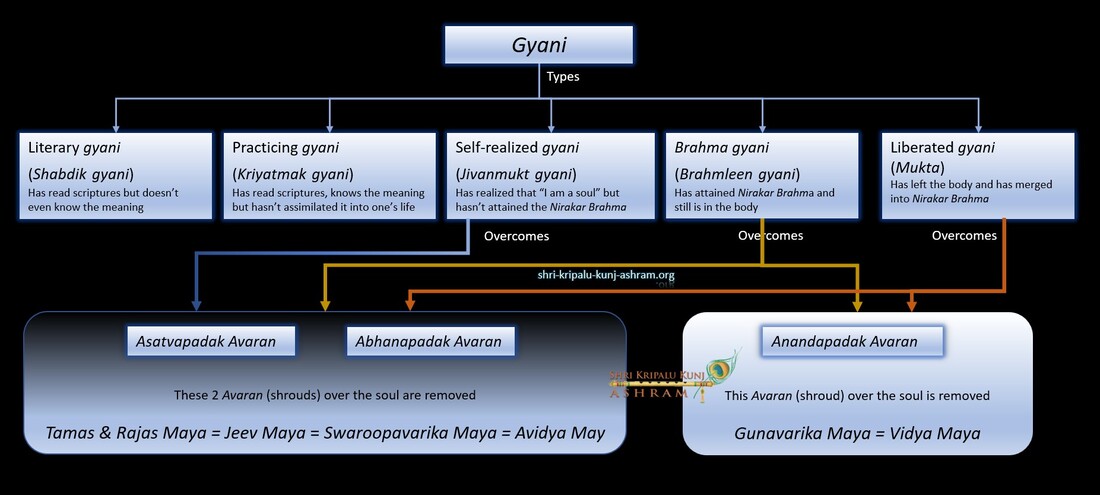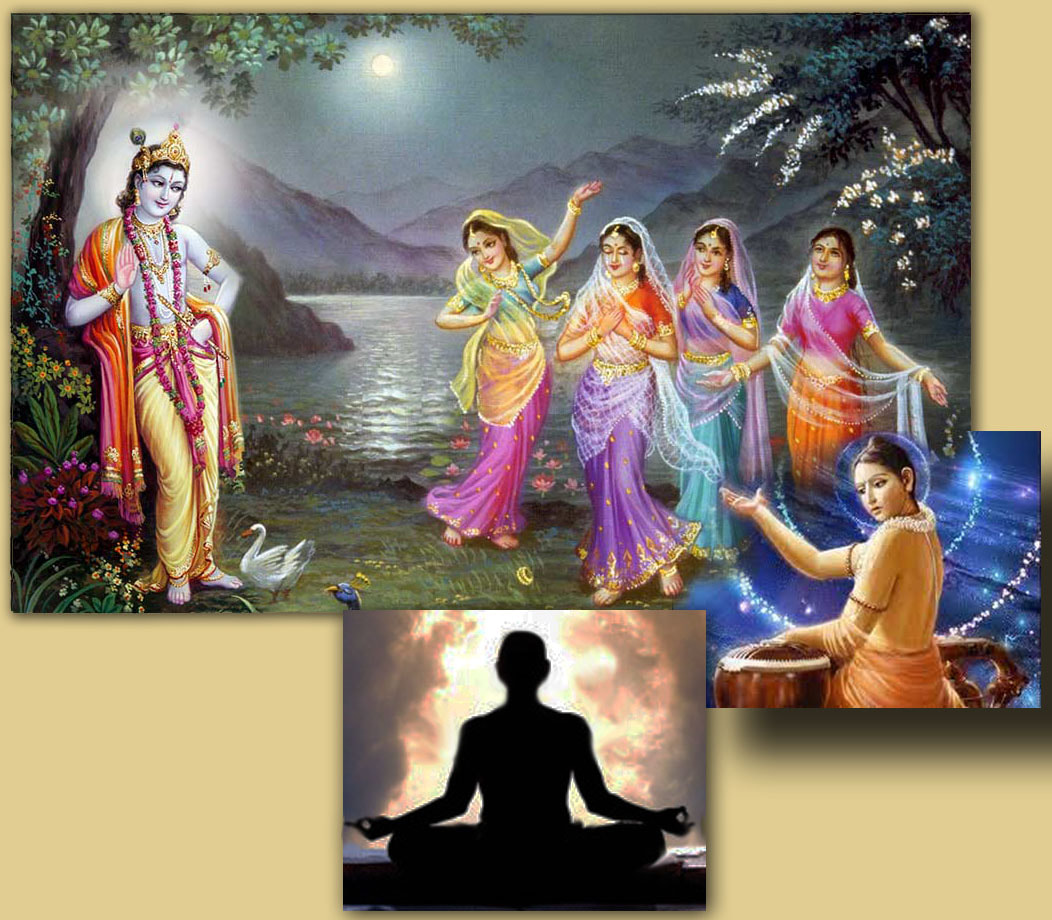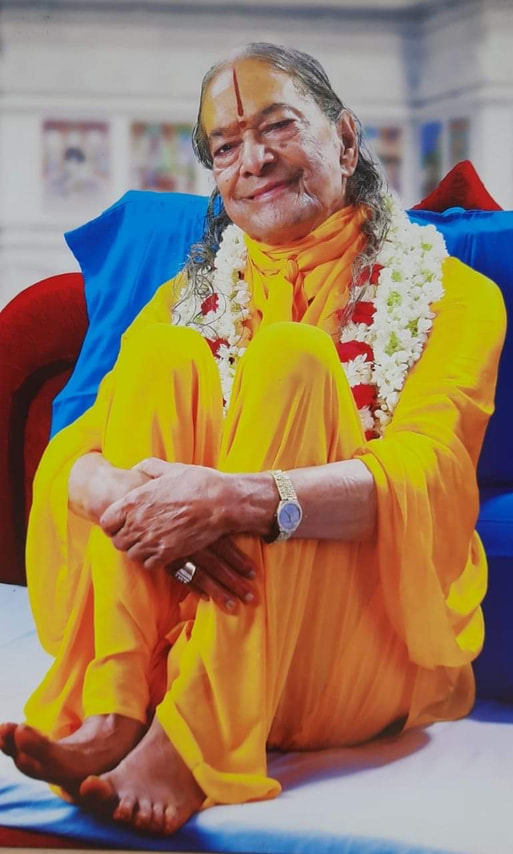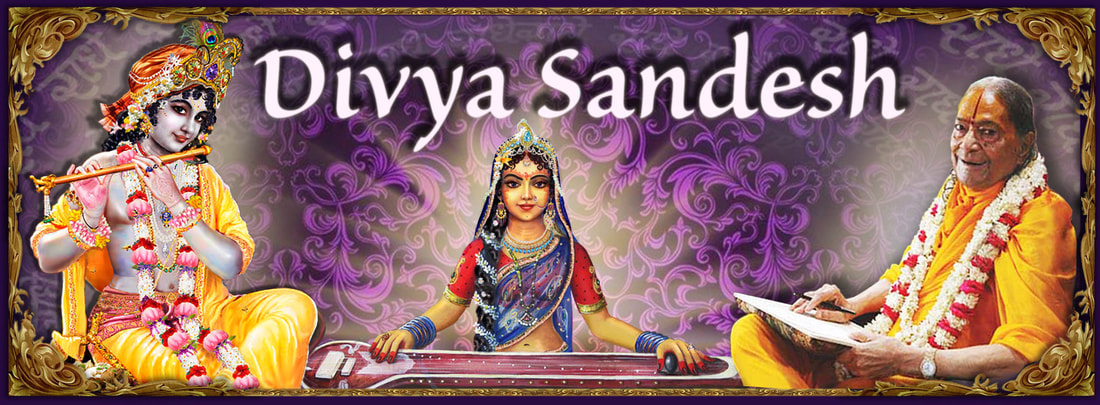Bhakti Grants Intense Ecstasy |
|
क्लेशघ्नी शुभदा मोक्षलघुताकृत् सुदुर्लभा। सान्द्रानन्दविशेषात्मा श्रीकृष्णाकर्षिणी च सा ॥
भक्तिरसामृतसिंधु
|
kleśaghnī śubhadā mokṣalaghutākṛt sudurlabhā। sāndrānandaviśeṣātmā śrīkṛṣṇākarṣiṇī ca sā ॥
Bhakti Rasamrit Sindhu
|
There are six qualities of devotion. We have discussed four of them so far -
As we discussed in the previous article, though Bhakti is attainable, it is extremely difficult to attain it [4]. Then what would be the compelling reason to put in that extra effort to attain it?
Let us answer that question in this article.
The fifth characteristic of bhakti is sāndrānandaviśeṣātmā which literally means “intense ecstasy”.
Bhakti is veritable unlimited, unparalleled bliss. It is indicated in Haribhaktisudhodaya -
- Bhakti slowly eradicates misery (kleśaghnī) [1].
- Grants auspiciousness (śubhadā ) [2].
- Trivializes the bliss of liberation (mokṣalaghutākṛt) [3].
- Extremely difficult to attain (sudurlabhā) [4].
As we discussed in the previous article, though Bhakti is attainable, it is extremely difficult to attain it [4]. Then what would be the compelling reason to put in that extra effort to attain it?
Let us answer that question in this article.
The fifth characteristic of bhakti is sāndrānandaviśeṣātmā which literally means “intense ecstasy”.
Bhakti is veritable unlimited, unparalleled bliss. It is indicated in Haribhaktisudhodaya -
|
त्वत्साक्षात्करणाह्लादविशुद्धाब्धिस्थितस्य मे । ते ब्राह्माण्यपि जगद्गुरो ॥
हरिभक्तिसुधोदय
|
tvatsākṣātkaraṇāhlādaviśuddhābdhisthitasya me । te brāhmāṇyapi jagadguro ॥
haribhaktisudhodaya
|
 "Brahmanand seems insignificant like the water contained in the hole made by the hoof of a cow.”
"Brahmanand seems insignificant like the water contained in the hole made by the hoof of a cow.”
“O Supreme Master of the world ! Now I dwell in you, the divine ocean of holy water. Hence, to me the Brahmanand seems insignificant like the water contained in the hole made by the hoof of a cow.”
It means that even though the bliss of bhakti and the bliss of mukti are both divine and everlasting, yet the intense ecstasy of divine bhakti is incomparable with the bliss of mukti. We consider the body as ‘I’. Therefore we exert way too much effort to accumulate material things. But the unfortunate truth is that those material things only grant temporary sensual happiness to the body. They do not satisfy the soul, the real ‘I’, which seeks the divine bliss of the Supreme soul. This is the nature of the world.
Unlike the seekers of divine love, an aspirant of the path of Gyan strives to attain the knowledge of self. Attaining this knowledge is a gradual and arduous path [5].
It means that even though the bliss of bhakti and the bliss of mukti are both divine and everlasting, yet the intense ecstasy of divine bhakti is incomparable with the bliss of mukti. We consider the body as ‘I’. Therefore we exert way too much effort to accumulate material things. But the unfortunate truth is that those material things only grant temporary sensual happiness to the body. They do not satisfy the soul, the real ‘I’, which seeks the divine bliss of the Supreme soul. This is the nature of the world.
Unlike the seekers of divine love, an aspirant of the path of Gyan strives to attain the knowledge of self. Attaining this knowledge is a gradual and arduous path [5].
To add to the difficulty, unlike the path of Bhakti - in which the devotee takes each step relying on the grace of God, there is no safety net on this path.
The Gyani, on the other hand, has to tread this path on their own accord as they worship the formless God who doesn’t bestow grace. At the end of it all, he attains self-realization which makes him so excessively happy that he thinks there is nothing beyond it. Such kinds of Gyanis are called Jeevanmukta [6]. This was the state of Jad Bharat before he became a deer. The bliss of realization of self (divine soul) is great. Sometimes after attaining self-realization [7], these seekers get confused, thinking this to be the bliss of Brahm. In reality, it is Atmagyan, the realization of the Atma, the self.
The Gyani, on the other hand, has to tread this path on their own accord as they worship the formless God who doesn’t bestow grace. At the end of it all, he attains self-realization which makes him so excessively happy that he thinks there is nothing beyond it. Such kinds of Gyanis are called Jeevanmukta [6]. This was the state of Jad Bharat before he became a deer. The bliss of realization of self (divine soul) is great. Sometimes after attaining self-realization [7], these seekers get confused, thinking this to be the bliss of Brahm. In reality, it is Atmagyan, the realization of the Atma, the self.
It is important to note here that attaining this state is very very very difficult and this is not the end of the journey. If such aspirants have the guidance of a bona fide Gyan margi Guru and the seeker follows the advice, then such a gyani engages in devotion to Sakar Brahm . It is by the grace of Sakar Brahm that gyani can attain bliss of Nirakar Brahm. Saint Tulsi das has compared this whole process to Ghunakshar Nyay (घुणाक्षर न्याय).
|
होइ घुणाक्षर न्याय तो पुनि प्रत्यूह अनेक
|
hoi ghuṇākṣara nyāya to puni pratyūha aneka
|
Weevil (Ghuna) is an insect which survives by eating grains. Please note the intellect of an insect is incredibly low. With that much intellect learning alphabets is impossible. Without knowing the alphabets, while gnawing into the grain, carving out Lord’s name like Ram, Shyam etc is an extremely slim possibility. Yet, if it ever happens to carve Lord’s name then the all-gracious Lord bestows mukti upon that insect. This is called Ghunakshar Nyay. Similarly, the probability of attaining brahmanand is abysmally low as gyani cannot lean on Nirakar Brahm to provide support and there are countless impediments on the way.
After attaining Nirakar Brahm, while the Gyani is still in the human form his state is called Brahma-Bhoot-Awasta. The bliss of such a devotee is described in Gita –
After attaining Nirakar Brahm, while the Gyani is still in the human form his state is called Brahma-Bhoot-Awasta. The bliss of such a devotee is described in Gita –
|
ब्रह्मभूत: प्रसन्नात्मा न शोचति न काङ्क्षति |
सम: सर्वेषु भूतेषु मद्भक्तिं लभते पराम् || गीता 18.54
|
brahmabhūta: prasannātmā na śocati na kāṅ kṣati |
sama: sarveṣu bhūteṣu madbhaktiṃ labhate parām || gītā 18.54
|
“Those who attain the status of Brahma-Bhoot-Awasta, they neither get distressed nor long for anything. They perceive the soul in everyone, hence everything and everyone seems non-different from oneself”.
This bliss of Brahm is called Brahmanand and it is unlimited and eternal. But that is also not the Supreme bliss. They only attain the inkling of divine bliss, but do not perceive God, who is the source of that unlimited divine bliss.
This bliss of Brahm is called Brahmanand and it is unlimited and eternal. But that is also not the Supreme bliss. They only attain the inkling of divine bliss, but do not perceive God, who is the source of that unlimited divine bliss.
|
ब्रह्मानन्दो भवेदेष चेत् परार्द्धगुणीकृतः।
नैति भक्तिसुखाम्भोधेः परमाणुतुलामपि ॥ |
brahmānando bhavedeṣa cet parārddhaguṇīkṛtaḥ ।
naiti bhaktisukhāmbhodheḥ paramāṇutulāmapi ॥ |
|
“The combined bliss of millions of achievers of Brahmanand is far less than even an iota of Premanand, which is attained only by Bhakti”.
Once Narad Muni visited the holy land of Braj and after that He started beating His chest and lamented loudly. People asked Him the reason for such excessive grief. He replied these gyanis expend so much effort to attain bliss but I am so sad for them. They can never taste the bliss of bhakti that these people in Braj get to enjoy and it made so easily available to Them. After brahmleen gyanis leave the body they are called mukta gyani. A question arises - is it possible for those who have attained God realization to attain the bliss of Bhakti by practicing devotion? The Gita provides the answer - |
|
मुक्तानामपि सिद्धानां नारायणपरायण: ।
सुदुर्लभ: प्रशान्तात्मा कोटिष्वपि महामुने ॥ |
muktānāmapi siddhānāṃ nārāyaṇaparāyaṇa: ।
sudurlabha: praśāntātmā koṭiṣvapi mahāmune ॥ |
Even if these liberated souls engage in bhakti after being emancipated, Bhakti is inaccessible for them. However, there are very few exceptional souls who have attained it. Before switching to the path of gyan, these jeev had performed bhakti. Thus they built a Bhavdeh of Bhakti. There is an extremely rare possibility for some such souls to attain the bliss of Bhakti but only to some extent (not fully).
It is for experiencing this exquisite, indescribable sweetness that one needs to expend the extra effort for attaining selfless love of Shri Krishna [8]. Experiencing this intense ecstasy is not possible by any other means than devotion [9].
It is for experiencing this exquisite, indescribable sweetness that one needs to expend the extra effort for attaining selfless love of Shri Krishna [8]. Experiencing this intense ecstasy is not possible by any other means than devotion [9].
|
तेरी छवि ज्ञानियों के गोविंद राधे | मरे हुए मन को भी फिर ते जिला दे ||
terī chavi jñāniyoṃ ke goviṃda rādhe | mare hue mana ko bhī phira te jilā de || Radha Govind Geet 165
Gyanis do not have a mind and the pure soul merges into the Impersonal Brahm. Since they have no mind they are free from any attachment or aversion. But upon seeing Your beautiful divine form, (the personal form of God), they now want to experience all kinds of divine sentiments.
- Jagadguruttam Shri Kripalu Maharaj
|
Bibliography - LEARN MORE
Some Pointers to Explore our Literature
Indulge yourself in spiritual material - Click on the images below or the headers
Divya Sandesh
|
Divya Ras Bindu
|
Spiritual Terms
|
|
We would love to hear from you. Please
|
To get notification about our publications please subscribe by entering the information above
|











